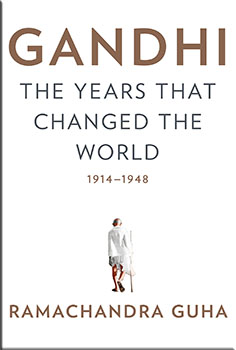Timeless Inspirator - Reliving Gandhi : Conceptualized and Edited by Raghunath Malshekar
Published by SAKAL for Gandhi National Memorial Society, Pune, India
Price - Rs. 490/-.
--------------------------------------------------------------------------------
Relevance of Mahatma Gandhi
R. Devarajan

How relevant is Mahatma Gandhi in the 21st century? As many as 46 eminent Indians from various fields were asked this question by Raghunath Mashelkar, the internationally acclaimed scientist, and their responses are presented in this book. Mashelkar himself has this to say about it: “… not just a mere collection of thoughts. Collectively, it is the road map, or the way of life; it is the anchor for a youngster in search of inspiration.” “Gandhian Engineering” is a concept enunciated by Mashelkar in a talk he delivered in Australia in April 2008. More recently, in July 2010, it was further refined and redefined as “Gandhian Innovation,” and published in the Harward Business Review as an article, authored jointly by him and C.K. Prahalad. The crux of it is how to generate “more, from less, for more people”.
The galaxy of contributors is as varied as it is distinguished. To mention a few of them: Amjad Ali Khan, Anil Kakodkar, Gopalkrishna Gandhi, Narayana Murthy, Kiran Bedi, M.S. Swaminathan, Mallika Sarabhai, Rahul Bajaj, Sachin Tendulkar, Sam Pitroda, and Sunil Gavaskar.
Every article has one aphorism or another pronounced by Gandhiji. Here is a sample: “Each of us must be the change we wish to see in this world”; “An eye for an eye makes the whole world blind”; “The future depends on what we do in the present”; “Earth provides enough to satisfy every man's need, but not every man's greed”; and “Truth alone will endure, all the rest will be swept away before the tide of time.”
Valid teachings
More than ever before, Gandhiji's teachings are valid today, when people are trying to find solutions to the rampant greed, widespread violence, and runaway consumptive style of living. Anu Aga, one of India's foremost women achievers, says that while, in the name of retaliation, violence and hatred are being perpetrated today Gandhiji's gospel of non-violence makes immense sense.
It was the unique non-violent movement under his leadership that earned for India freedom from the colonial rule. In spearheading the campaign against the alien rule, Gandhiji adopted the innovative techniques of civil disobedience and social transformation, which had several exemplary features.
The Gandhian technique of mobilising people has been successfully employed by many oppressed societies around the world under the leadership of people like Martin Luther King in the United States, Nelson Mandela in South Africa, and now Aung Saan Sun Kyi in Myanmar, which is an eloquent testimony to the continuing relevance of Mahatma Gandhi.
In India, economic development has been mostly confined to the urban conglomerates. In the process, the rural India that comprises 700 million people has been given short shrift. Gandhiji's philosophy of inclusive growth is fundamental to the building of a resurgent rural India. He believed in “production by the masses” rather than in mass production, a distinctive feature of the industrial revolution. It is surprising, even paradoxical, that these days Gandhian philosophy should find increasing expression through the most modern technology! Now, it is possible to establish small-scale and medium-scale factories in smaller towns and remote corners of the country, thanks to the phenomenal innovations in communication and information technologies. New technologies have brought in widespread and low-cost electronic connectivity that enables instantaneous contact between industrial units and the sellers and consumers of their products. Location and logistics are no more a limitation or constraint for industrial development.
To quote Sam Pitroda, “While the twenty-first century has been defined by globalisation, free markets, privatisation, liberalisation… it has also been marked by violence, extremism, inequity, poverty, and disparity. Amidst all this, if one poses the question of relevance of Gandhiji to our age, one is struck by an astounding need for him for our times. Gandhiji's ideals… and leadership hold an extremely relevant moral and social mirror to our society.” Thus, the Gandhian model and the modern economy seem to be getting closer to each other. True to its title, the book will inspire social scientists, wherever they may be, for all times to come. Gandhiji did not belong to an era, or an age. He belongs to the humanity for eternity.
Courtesy: The Hindu, dt. 07.12.2010
http://www.thehindu.com/arts/books/article937457.ece



